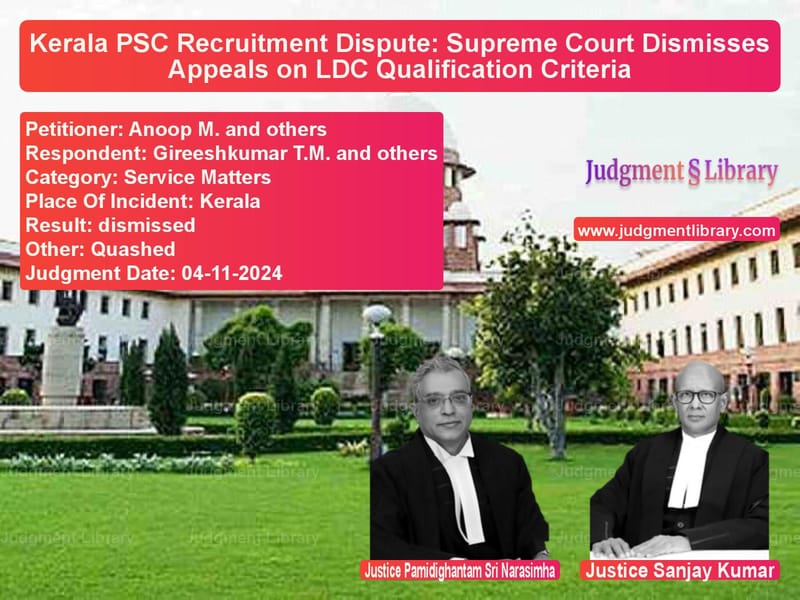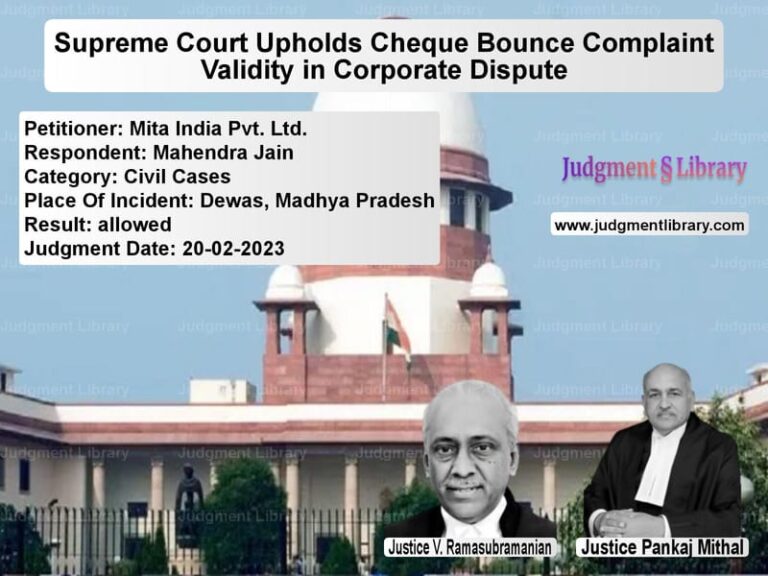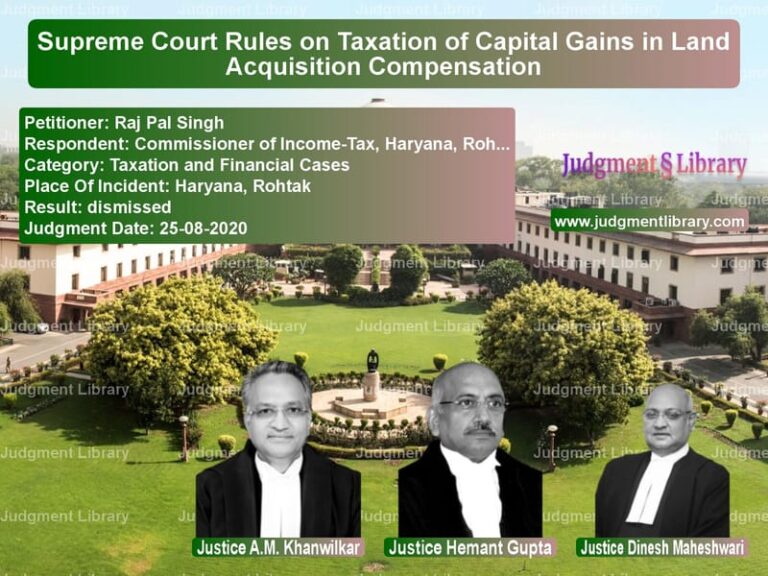Kerala PSC Recruitment Dispute: Supreme Court Dismisses Appeals on LDC Qualification Criteria
The Supreme Court of India recently delivered a landmark judgment in the case of Anoop M. and others vs. Gireeshkumar T.M. and others, settling a long-standing dispute over the eligibility criteria for recruitment to the post of Lower Division Clerk (LDC) in the Kerala Water Authority. The case revolved around whether candidates possessing a Diploma in Computer Applications (DCA) or higher qualifications should be considered eligible for the post, despite the recruitment notification specifying a particular certification in Data Entry and Office Automation.
Background of the Case
In 2012, the Kerala Public Service Commission (KPSC) issued a notification for filling up 102 existing vacancies and 43 anticipated vacancies for the post of LDC in the Kerala Water Authority. The qualifications prescribed in the notification were:
- A degree in any discipline
- A Certificate in Data Entry and Office Automation of a minimum of 3 months (120 hours) duration, awarded by the Lal Bahadur Shastri Centre for Science and Technology (LBS), the Institute of Human Resource Development (IHRD), or any similar/equivalent institution approved by the government
However, a candidate, Shebin A.S., who held a DCA, challenged these qualifications before the Kerala High Court, arguing that they unfairly excluded candidates with higher qualifications. The High Court agreed and directed KPSC to revise the notification, ensuring greater transparency.
Legal Challenges and High Court Rulings
Kerala PSC’s Stand Against Equivalence
Aggrieved by the High Court’s ruling, KPSC filed a review petition arguing that there was no provision in the notification or the Special Rules governing the post that allowed equivalent or higher qualifications. KPSC maintained that it had received 590 applications from candidates holding a DCA qualification but did not treat them as valid.
The review petition was dismissed, following which KPSC filed Writ Appeal No. 1501 of 2015. The Kerala High Court’s Division Bench ruled in favor of KPSC, stating that since the notification did not mention DCA as an eligible qualification, candidates holding it could not be considered.
KPSC’s Sudden Change in Stance
Despite winning the case, KPSC surprisingly included DCA-qualified candidates in the ranked list. This led to another round of litigation, with candidates who held the prescribed qualification filing writ petitions to challenge the ranked list.
The petitioners argued that KPSC could not include candidates with DCA qualifications after previously asserting that they were ineligible. The Kerala High Court ruled in their favor, directing KPSC to recast the ranked list and include only candidates possessing the prescribed qualification.
Supreme Court’s Observations and Judgment
The Supreme Court upheld the Kerala High Court’s decision, dismissing the appeals filed by KPSC and DCA-qualified candidates. The Court noted several critical aspects:
1. KPSC’s Contradictory Stand
The Supreme Court strongly criticized KPSC for taking contradictory stands at different stages of the litigation. The Court remarked:
“Despite winning the previous case, the KPSC did a volte-face and included DCA-qualified candidates in the ranked list, leading to further unnecessary litigation.”
2. Interpretation of the Qualification Rules
The Court examined the Kerala Water Authority (Administrative, Ministerial, and Last Grade) Service Rules, 2011, which did not permit equivalent qualifications for the LDC post. While the rules allowed equivalent qualifications for other posts, such as Legal Assistant and Confidential Assistant Grade II, no such provision existed for LDCs.
The Court held:
“The absence of an equivalence clause in the Special Rules clearly indicates that only the prescribed certification can be considered.”
3. No Exercise to Establish Equivalence
The Court criticized KPSC for failing to conduct any assessment to determine whether a DCA was genuinely superior to the prescribed certificate in Data Entry and Office Automation. It stated:
“No material has been placed before us to demonstrate that KPSC undertook any exercise to compare the curriculum of each qualification to assess whether a DCA pre-supposes the prescribed qualification.”
4. Rule of Law and Consistency
The Court emphasized the importance of consistency in decision-making by government authorities. It cited Sivanandan C.T. vs. High Court of Kerala, stating:
“A decision of a public authority taken without any basis in principle or rule is unpredictable and is, therefore, arbitrary and antithetical to the rule of law.”
Final Judgment
The Supreme Court dismissed the appeals and upheld the Kerala High Court’s directive:
- KPSC must revise the ranked list and exclude all DCA-qualified candidates.
- Only candidates possessing the prescribed certificate in Data Entry and Office Automation should be considered for appointment.
- KPSC must ensure transparency and consistency in future recruitment processes.
Implications of the Judgment
The ruling has significant implications for public sector recruitment:
- Strict adherence to recruitment rules: Government bodies must follow the qualifications prescribed in recruitment notifications without introducing changes arbitrarily.
- Consistency in decision-making: Recruitment agencies cannot change their stance midway through selection processes.
- Impact on other pending cases: The ruling may influence similar cases where candidates with higher qualifications challenge recruitment notifications.
This Supreme Court verdict reinforces the principle that recruitment bodies must maintain fairness, predictability, and adherence to established rules while conducting selection processes.
Petitioner Name: Anoop M. and others.Respondent Name: Gireeshkumar T.M. and others.Judgment By: Justice Pamidighantam Sri Narasimha, Justice Sanjay Kumar.Place Of Incident: Kerala.Judgment Date: 04-11-2024.
Don’t miss out on the full details! Download the complete judgment in PDF format below and gain valuable insights instantly!
Download Judgment: anoop-m.-and-others-vs-gireeshkumar-t.m.-an-supreme-court-of-india-judgment-dated-04-11-2024.pdf
Directly Download Judgment: Directly download this Judgment
See all petitions in Recruitment Policies
See all petitions in Public Sector Employees
See all petitions in Employment Disputes
See all petitions in Termination Cases
See all petitions in Disciplinary Proceedings
See all petitions in Judgment by P.S. Narasimha
See all petitions in Judgment by Sanjay Kumar
See all petitions in dismissed
See all petitions in Quashed
See all petitions in supreme court of India judgments November 2024
See all petitions in 2024 judgments
See all posts in Service Matters Category
See all allowed petitions in Service Matters Category
See all Dismissed petitions in Service Matters Category
See all partially allowed petitions in Service Matters Category







